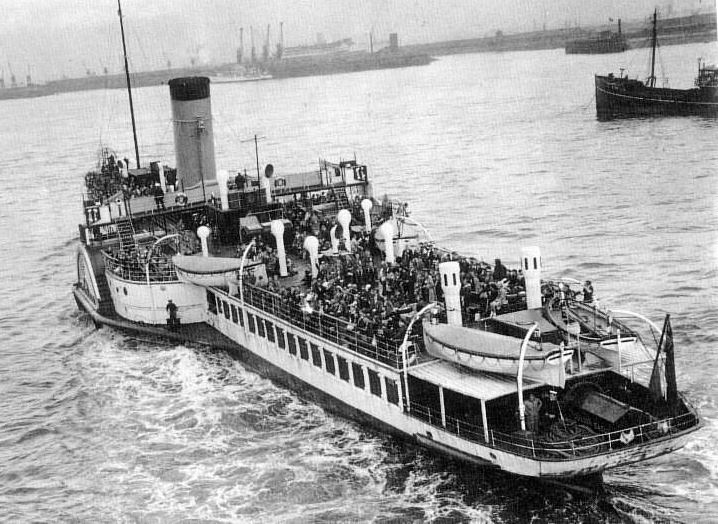Difference between revisions of "HMT Golden Eagle"
From Our Contribution
(→Folkestone to Étaples 28 February 1917) |
(→Folkestone to Étaples 17 December 1916) |
||
| (6 intermediate revisions by the same user not shown) | |||
| Line 1: | Line 1: | ||
| − | {{Infobox | + | {{Infobox ship |
| − | | | + | | image = [[File:HMT_Golden_Eagle_1.jpg]] |
| − | |||
| − | |||
| − | |||
| − | |||
| − | |||
| − | |||
| caption = | | caption = | ||
| − | | | + | | image2 = [[File:HMT_Golden_Eagle_2.jpg]] |
| caption2 = | | caption2 = | ||
| − | + | | shipname = HMT Golden Eagle | |
| − | + | | shipowner = The General Steam Navigation Co Ltd, London | |
| − | + | | shipbuilder = John Brown & Co Ltd, Clydebank | |
| − | + | | shipyardnumber = 386 | |
| − | + | | shiplaunched = 17 Apr 1909 | |
| − | | | + | | shipcompleted = 9 Jun 1909 |
| − | + | | shipinservice = 1909 | |
| − | | | + | | shipoutofservice = 1949 |
| − | | | + | | shipinservice2 = |
| − | + | | shipoutofservice2 = | |
| − | | | + | | shipreclassified = |
| − | | | + | | shipID = |
| − | + | | shipfate = brolen up 1951 | |
| − | | | + | | shiptype = Steal Paddle Steamer |
| − | | | + | | shiptonnage = 793 tons |
| − | + | | shiplength = 275.7 ft (84.0m) | |
| − | | | + | | shipbeam = 32.1 ft (9.78m) |
| − | | | + | | shipdepth = 10.1 ft (3.08m) |
| − | + | | shippropulsion =Two side mounted paddle wheels | |
| − | | | + | | shipspeed = |
| − | | | + | | shipcapacity = |
| − | |||
| − | | | ||
| − | | | ||
}} | }} | ||
==Remarks== | ==Remarks== | ||
| − | Built for The General Steam Navigation Co Ltd, London. | + | Built for The General Steam Navigation Co Ltd, London. She served with the Royal Navy in both world wars. Used for troop transport during WW1, with an incomplete conversion to minelayer halted in 1918. |
| − | |||
| − | Laid up 1949, and broken up in 1951. | + | At teh beginning of WW2 she assisted withthe transfer of children from London to safer towns and ciies, transfering more than 3,000 to Great Yarmouth. In Jan 1940 she was requisitioned as an anti-aircraft ship for the Dunkirk evacuation. In addition she evacuated 1,751 British soldiers. Later used as an accommodation ship, before returning to its owners in June 1945 for coastal service. Laid up 1949, and broken up in 1951 by T W Ward Ltd at Grays, Essex. |
==Soldiers carried== | ==Soldiers carried== | ||
| Line 50: | Line 40: | ||
===Folkestone to Étaples 10 December 1916=== | ===Folkestone to Étaples 10 December 1916=== | ||
| − | * [[Richard John James Bransby]] | + | * † [[Richard John James Bransby]] |
===Folkestone to Étaples 17 December 1916=== | ===Folkestone to Étaples 17 December 1916=== | ||
* [[Thomas Kinsman Bickell]] | * [[Thomas Kinsman Bickell]] | ||
* [[Cecil Walter Challis]] | * [[Cecil Walter Challis]] | ||
| + | * † [[William Duffy]] | ||
* [[Charles Henry Partridge]] | * [[Charles Henry Partridge]] | ||
* [[William George Rosekelly]] | * [[William George Rosekelly]] | ||
Latest revision as of 23:49, 27 August 2023
Contents
Remarks
Built for The General Steam Navigation Co Ltd, London. She served with the Royal Navy in both world wars. Used for troop transport during WW1, with an incomplete conversion to minelayer halted in 1918.
At teh beginning of WW2 she assisted withthe transfer of children from London to safer towns and ciies, transfering more than 3,000 to Great Yarmouth. In Jan 1940 she was requisitioned as an anti-aircraft ship for the Dunkirk evacuation. In addition she evacuated 1,751 British soldiers. Later used as an accommodation ship, before returning to its owners in June 1945 for coastal service. Laid up 1949, and broken up in 1951 by T W Ward Ltd at Grays, Essex.
Soldiers carried
Folkestone to Étaples 11 November 1916
Folkestone to Étaples 10 December 1916
Folkestone to Étaples 17 December 1916
- Thomas Kinsman Bickell
- Cecil Walter Challis
- † William Duffy
- Charles Henry Partridge
- William George Rosekelly
Folkestone to Étaples 25 February 1917
- Benjamin Jones
- John Arthur Patterson MM
- Thomas Ramsell
- Thomas Edward Tyrell Marshall Post WW1 men
- James Thomson MM

